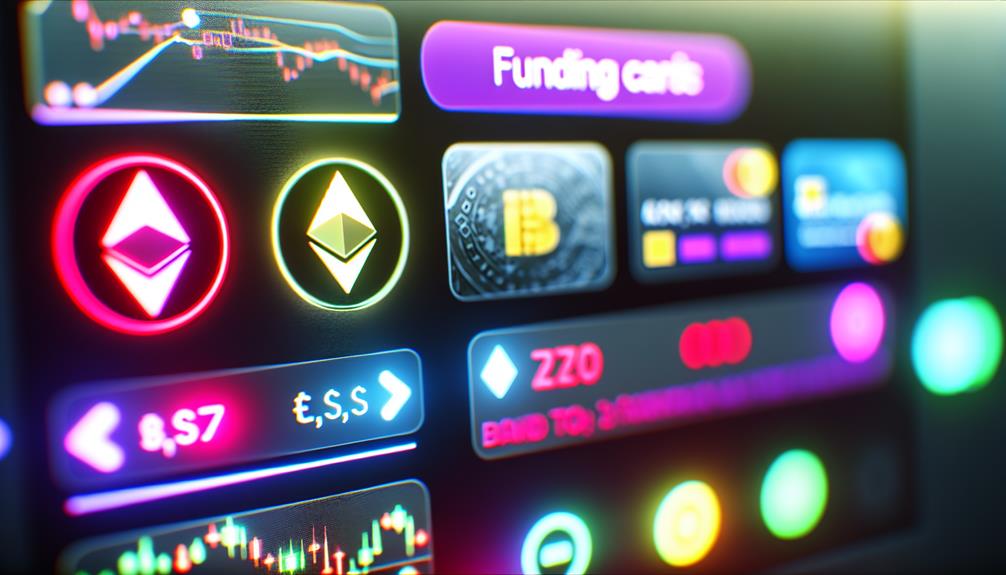If you're considering buying Ethereum, you'll want to start by choosing a reliable cryptocurrency exchange that aligns with your preferences. It's important to weigh factors such as fees, security, and user experience before creating an account. Once you've made your choice, you'll need to go through identity verification and funding processes, which can sometimes feel tedious. But before you place your first order, there are a few key strategies and best practices that can greatly impact your experience—and it's worth exploring these further.
Understanding Ethereum

Ethereum, launched in 2015, is more than just a cryptocurrency; it's a decentralized platform that enables developers to build and deploy smart contracts and decentralized applications (dApps). To truly grasp Ethereum fundamentals, you need to understand its underlying architecture, which is based on blockchain technology. This decentralized ledger guarantees transparency and security while allowing multiple parties to interact without intermediaries.
Smart contracts are one of the core innovations of Ethereum. These self-executing contracts with the terms directly written into code automate processes and transactions. They eliminate the need for trust in third parties, as they execute automatically when predefined conditions are met. For instance, if you're developing a dApp for real estate, a smart contract can facilitate property transfers without requiring a notary or intermediary, streamlining the entire process.
At its core, Ethereum operates on a system of nodes, each maintaining a copy of the blockchain. This decentralized nature contributes to its resilience against censorship and fraud. Additionally, Ethereum's native cryptocurrency, Ether (ETH), serves as both a medium of exchange and a means of paying for computational services on the network.
Understanding Ethereum means recognizing its potential to disrupt traditional industries by enabling decentralized solutions that offer new efficiencies and possibilities. As you explore deeper into this ecosystem, you'll see how smart contracts can revolutionize various sectors, from finance to supply chain management.
Choosing a Cryptocurrency Exchange
When it comes to buying Ethereum, selecting the right cryptocurrency exchange is essential to guarantee a smooth and secure transaction process. You'll want to take into account several factors before making your choice. Start by evaluating the exchange fees, as these can greatly impact your overall investment. Compare different platforms to find one that offers competitive rates without hidden costs.
Next, look at the available trading pairs. A broader selection allows for greater flexibility in your trading strategies, especially if you plan to diversify your portfolio later on. Additionally, check the exchange liquidity; high liquidity guarantees that you can execute trades quickly without affecting the price.
User reviews can provide valuable insights into the exchange's reliability and performance. Look for feedback on platform security, as a robust security framework is critical to protect your assets from hacks and fraud. Also, assess the quality of customer support; responsive and knowledgeable support can make a big difference if you encounter issues.
If you prefer trading on the go, think about exchanges with a mobile app that offers a seamless user experience. Finally, pay attention to withdrawal limits, as these can affect your ability to access your funds when needed. By carefully evaluating these aspects, you can choose a cryptocurrency exchange that aligns with your needs and helps you buy Ethereum efficiently and safely.
Creating an Account

Creating an account is a vital step in purchasing Ethereum, and it starts with selecting a reliable cryptocurrency exchange. You'll need to verify your identity to comply with regulatory requirements, which often involves uploading documentation. Finally, once your account is verified, you'll fund it to facilitate your Ethereum transactions.
Choose a Cryptocurrency Exchange
Selecting a cryptocurrency exchange is essential in your journey to buy Ethereum, as it directly impacts your trading experience and security. When you choose an exchange, consider several key factors that affect your trading strategy and overall satisfaction.
- Trading Fees: Different exchanges have varying fee structures; lower fees can greatly enhance your ROI.
- Platform Security: Confirm the exchange has robust security measures in place to protect your assets.
- User Reviews: Look for feedback from other users for insights into the platform's reliability and performance.
- Supported Currencies: Check which cryptocurrencies you can trade alongside Ethereum; a diverse range may offer better opportunities.
- Customer Support: Reliable support can be essential, especially if you encounter issues during trading.
Moreover, consider the liquidity levels and trading pairs available on the platform, as these can affect your ability to execute trades efficiently. Finally, evaluate the mobile app functionality, withdrawal limits, and order types offered, as these features contribute to a seamless trading experience. Make informed decisions to optimize your Ethereum purchasing journey.
Verify Your Identity
After choosing a cryptocurrency exchange, the next step involves verifying your identity to comply with regulatory requirements and enhance security. This process, known as identity verification, is essential for preventing fraud and guaranteeing that you're a legitimate user. Most exchanges require you to create an account by providing basic information such as your name, email address, and phone number.
Once you've registered, you'll typically need to upload specific documents to meet the document requirements. These usually include a government-issued ID, like a passport or driver's license, and sometimes a utility bill or bank statement to confirm your address. Some exchanges may use advanced technology for real-time verification, while others might take longer to process your documents.
It's important to verify that your documents are clear and legible to avoid delays. After submitting your identity verification documents, the exchange will review them and notify you of the outcome. This step may seem cumbersome, but it's a necessary part of the process that protects both you and the exchange from potential risks associated with cryptocurrency transactions. Once verification is complete, you'll be ready to proceed to the next steps in buying Ethereum.
Fund Your Account
Funding your account is an essential step in the process of buying Ethereum, as it enables you to execute trades effectively. Once you've created your account and verified your identity, the next step is to choose a suitable funding method. Different platforms offer various options, each with distinct transaction fees and processing times. It's important to evaluate each method to find one that aligns with your trading needs.
Here are some common funding methods to keep in mind:
- Bank Transfers: Often low in fees but may take several days to process.
- Credit/Debit Cards: Instant deposits, but they usually come with higher transaction fees.
- PayPal: Convenient for many users, though fees can be significant.
- Cryptocurrency Deposits: If you already own crypto, transferring it may be the most cost-effective option.
- Wire Transfers: Fast and reliable, but typically involve higher fees.
Understanding the nuances of these funding methods will help guarantee you're not caught off guard by unexpected costs. Always review transaction fees associated with each option to maximize your investment potential.
Verifying Your Identity
To purchase Ethereum, you'll need to verify your identity through a series of steps mandated by most platforms. This process typically involves submitting required identification documents and understanding the KYC (Know Your Customer) regulations in place. It is crucial to be aware of the privacy and security measures that protect your information during this verification.
Required Identification Documents
Verifying your identity is an essential step when buying Ethereum, as most exchanges require specific identification documents to comply with regulatory standards. Understanding the identification types and document requirements can streamline your purchasing process and guarantee a smooth experience.
Typically, you'll need to prepare the following documents:
- Government-issued ID: This could be a passport, driver's license, or national ID card.
- Proof of address: Utility bills, bank statements, or lease agreements dated within the last three months typically suffice.
- Selfie or live photo: Some exchanges may request a photo of you holding your ID to verify that it matches your appearance.
- Tax identification number: In some regions, you may need to provide your Social Security number or equivalent.
- Payment method verification: If you're using a bank account or credit card, you might need to add a document confirming ownership, such as a bank statement.
KYC Process Overview
The KYC (Know Your Customer) process is a crucial component of buying Ethereum through exchanges, as it guarantees compliance with regulatory requirements and helps prevent fraud. This onboarding process typically involves identity verification, where you'll need to provide personal information and documentation. While KYC regulations are fundamental for guaranteeing a secure trading environment, they can also present compliance challenges, particularly for those new to the crypto space.
Data protection is paramount during this process, as you're sharing sensitive information. Reputable exchanges implement robust measures to safeguard your data, thereby maintaining digital privacy. However, it's essential to choose platforms that prioritize user experience while adhering to these standards. A seamless KYC process can enhance your overall experience, making it easier to navigate through identity verification without unnecessary delays.
Despite its importance in fraud prevention, the KYC process can sometimes feel cumbersome. Nevertheless, it's a necessary step to guarantee that your transactions are secure and compliant. By understanding the significance of these regulations, you can approach the KYC process with confidence, knowing it contributes to a safer cryptocurrency ecosystem.
Privacy and Security Measures
When traversing the identity verification process, it is vital to prioritize both privacy and security measures to protect your sensitive information. As you engage with various platforms to buy Ethereum, understanding how to maintain anonymity while ensuring transaction security is fundamental. Here's how you can enhance your privacy during this process:
- Choose platforms with strong encryption: Look for exchanges that utilize advanced encryption protocols to safeguard your data.
- Explore anonymity options: Some services allow for pseudonymous transactions, helping you maintain a degree of privacy.
- Utilize secure internet connections: Always use a VPN or secure networks to prevent interception of your data.
- Be cautious with personal information: Only provide the minimum required details for KYC processes, and consider using a separate email for crypto transactions.
- Regularly update passwords: Employ strong, unique passwords and enable two-factor authentication on your accounts to bolster security.
Funding Your Account

Funding your account is a crucial step in the process of buying Ethereum. Before you can make any purchases, you'll need to deposit funds into your trading account. Various payment methods are available, including bank transfers, credit or debit cards, and cryptocurrency deposits. Each method comes with distinct advantages and disadvantages that can affect your experience.
For instance, bank transfers typically offer lower transaction fees compared to credit card payments, but they may take longer to process. Credit card payments, on the other hand, are instant but often incur higher transaction fees. It's important to evaluate which payment method aligns best with your needs and budget.
When choosing a payment method, consider the transaction fees associated with each option. Fees can vary considerably between platforms, so it's worth doing your research to find a service that provides competitive rates. For example, some exchanges may offer promotions that waive transaction fees for specific deposit methods, which could enhance your overall cost-effectiveness.
Additionally, verify that the payment method you select is supported by the exchange you're using. Not all platforms accept every payment method, so confirming compatibility beforehand can save you time and frustration. Ultimately, understanding the implications of your chosen payment method and its associated fees will streamline the funding process, allowing you to focus on the next steps in acquiring Ethereum efficiently.
Placing Your Order
Once you've funded your account, it's time to plunge into placing your order for Ethereum. The first step is to choose the appropriate order type that aligns with your buying strategy. Understanding the difference between market orders and limit orders is essential for effective trading.
- Market Orders: These orders execute immediately at the current market price. They're ideal for swift transactions, but you might incur higher trading fees during volatile periods.
- Limit Orders: With limit orders, you set a specific price at which you're willing to buy. This can help avoid slippage but may delay order execution if the market doesn't reach your target price.
- Trading Fees: Be aware of the fees associated with each order type. Some platforms charge less for limit orders compared to market orders.
- Order Execution: The speed and efficiency of order execution can vary based on market conditions and the order type you choose.
- Price Alerts: Utilizing price alerts can enhance your buying strategies by notifying you when Ethereum hits your desired price, allowing for timely limit orders.
Ultimately, your choice of order type will depend on your risk tolerance and market conditions. Whether you're looking to capitalize on a market dip with a limit order or swiftly buy Ethereum with a market order, understanding these elements will empower you in your trading journey.
Storing Your Ethereum

After you've successfully placed your order and acquired Ethereum, the next step is determining how to store it securely. You have several options, primarily hardware wallets and software wallets. Hardware wallets, such as Ledger or Trezor, provide robust security since they store your private keys offline, minimizing the risk of hacks. On the other hand, software wallets, which can be desktop or mobile applications, offer convenience but require vigilant security practices to protect against malware and phishing attacks.
When choosing a wallet, consider wallet compatibility with your Ethereum holdings and the features you need. Multi-signature wallets can enhance security by requiring multiple private keys for transactions, making unauthorized access more difficult.
Regardless of the wallet type you choose, implementing effective backup strategies is essential. Regularly back up your wallet data and confirm that you have a reliable wallet recovery method in place. This could mean securely storing seed phrases or recovery keys in a safe location.
Keep in mind that wallet synchronization can vary between software wallets and may incur transaction fees, especially when transferring Ethereum. Always check the fee structure before making transactions to avoid unexpected costs. Ultimately, the security of your Ethereum largely depends on your diligence in following best practices for wallet management and safeguarding your private keys. By taking these steps, you can greatly reduce risks and guarantee that your investment remains secure.
Frequently Asked Questions
What Are the Transaction Fees for Buying Ethereum?
When considering transaction fees, you'll find they vary based on transaction fee structures and network congestion effects. High congestion typically leads to increased fees, so monitoring the network can help optimize your purchasing costs.
Can I Buy Ethereum With a Credit Card?
You can absolutely buy Ethereum with a credit card! Many platforms offer credit card options, ensuring payment security. However, be aware of potential fees and limits associated with such transactions to avoid surprises.
Is Ethereum a Good Long-Term Investment?
When considering Ethereum as a long-term investment, you should weigh its future potential against market volatility. While it shows promise, fluctuations could impact your returns, so thorough analysis and risk assessment are essential before committing.
How Do I Sell My Ethereum Later?
Selling strategies should focus on market timing to maximize returns. Monitor market trends, set target prices, and consider using limit orders. Staying informed guarantees you capitalize on Ethereum's fluctuating value effectively and efficiently.
What Are the Risks of Buying Ethereum?
When buying Ethereum, you should consider market volatility, regulatory concerns, security risks, and technological changes. Each factor can greatly impact your investment's value, so it's essential to stay informed and assess these risks carefully.
Conclusion
Buying Ethereum is like planting a seed in a digital garden; with the right conditions—selecting a solid exchange, verifying your identity, and funding your account—you can watch your investment grow. Just as a gardener must tend to their plants, you'll need to guarantee your Ethereum is securely stored in a wallet. By following these steps, you're not just purchasing a cryptocurrency; you're cultivating a potential future asset in the ever-evolving landscape of blockchain technology.
